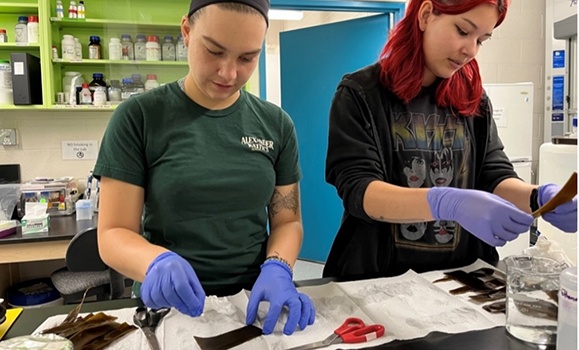
Ocean research at Dalhousie currently spans almost all faculties and disciplines
It all started with the establishment of the Institute of Oceanography in 1959, which launched a broader trajectory. Now Dal hosts key ocean research facilities and is involved in many international research projects, which allow Dalhousie researchers to contribute to the most pressing ocean challenges of our time.
Discover how our work in these key areas is helping support a healthy ocean
High-impact research
Research uncovers big role for tiny organisms in ocean
Scientists have found that Foraminifera or 'forams' absorb both nitrogen and phosphate from coastal waters, potentially providing a valuable weapon against harmful nutrient loading that can lead to toxic algae blooms, and decreased oxygen in the ocean. Read the Dal News story about this important this phosphate storage phenomenon.
Naming rights: Dal researchers christen new locally discovered microbe after Halifax
Dal researchers have identified a type of bacteria local to Halifax that could help scientists better understand the health of the ocean. Named T. haligoni in honour of the city where it was found (its full name is Candidatus Thalassolituus haligoni), this bacterium is what’s known to biologists as a diazotroph or nitrogen fixer — a kind of “fertilizer of the sea,” according to Sonja Rose, a Dal PhD candidate in biology who worked on the research. Read the Dal News story about this exciting discovery that will provide a better understanding of our ocean health.
Global fleet of undersea robots reveals the phytoplankton hidden beneath the ocean's surface
Phytoplankton can grow below the surface where satellites cannot detect them, leaving a significant gap in how we monitor one of Earth's most important primary producers, which carry out photosynthesis and form the base of the food web. Read the Dal News story about how researchers at Dal are changing that with the help of a growing global network of underwater robots known as Biogeochemical-Argo floats.
Monitoring the world’s wildest ocean
Researchers are developing a network called the North Atlantic Carbon Observatory, that will study the western North Atlantic to understand and mitigate the impact of climate changes on the ocean, which is a major carbon sink. Read the Dal News story about work underway to acquire the data and extract meaningful conclusions out of it.
How human activities are impacting one of the world's most remote whale species
Even in the deepest and most remote parts of the ocean, beaked whales cannot escape the harmful effects of human activity. Researchers have found that the reclusive, deep-sea dwelling species is exposed to 14 human-made threats despite being found in habitats far from cities, ports and other populous areas. Read the Dal News story to learn why one of the least encountered mammals on the planet cannot avoid human pressures.
New technology is helping scientists map the ocean floor in the Galápagos
The Benthic Ecosystem Mapping & Engagement (BEcoME) project is an OFI-supported research project led by Dalhousie and Memorial University. It aims to better understand the role of benthic habitats amidst the changing ocean climate. Read the Dal News story about how researchers are using the mapping technology.
Shark alert: Ground‑breaking global study reveals species still under threat from finning
Sweeping international measures meant to curb wasteful shark-finning practices are not enough to save threatened species, but researchers, including Dal's Dr. Boris Worm, recommend ways to stem the losses in a new study. Read the Dal News story about this ground-breaking global study to better understand trends in shark mortality.
Transforming Climate Action: Ensuring the science is safe
While scientists explore the feasibly of adding substances to the ocean to promote the absorption of CO2, oceanographer Dr. Hugh MacIntyre and his students are leading a parallel project to ensure interventions made in the ocean are safe for the creatures that call it home. Read the Dal News story about research into potential climate solutions.
Climate risk index shows threats to 90 per cent of the world’s marine species
While our study paints a potentially grim future under high emissions, it also highlights how our oceans and marine life could benefit from climate change mitigation and adaptation and stresses the urgency with which we must work towards this goal.![]() Read the Dal News story about threats to marine species.
Read the Dal News story about threats to marine species.
Ancient fish species on brink of extinction finds new life in Dal facility
A half-dozen large fibreglass tanks in the basement of Dalhousie's Steele Ocean Science Building contain the only remaining captive Atlantic whitefish on earth. Their existence is the result of the work of a small group of researchers and biologists committed to saving an ancient aquatic species that is so endangered its only known habitat is three lakes within a single watershed in Nova Scotia. Read the Dal News story about saving Atlantic whitefish.
Exceptional student experience
Students chart a path to success in Halifax’s booming ocean‑tech sector
Students from Dalhousie and other local post-secondary institutions embarked on a voyage around Halifax's thriving ocean-tech sector last month as part of a new industry networking event. Read the Dal News story about the first-ever Ocean Industry Crawl.
Learn how the ocean connects people across the world
Steps away from the Atlantic Ocean, Dalhousie has a global reputation for excellence in ocean education and research. When you study ocean sciences at Dalhousie, you’ll combine knowledge in the biological, chemical, geological and physical processes that make up ocean ecosystems.
The sea's the limit
If you’re passionate about the ocean, Dalhousie is where you want to be. We’re a national leader in marine biology education and research. You’ll learn in the classroom, lab and out in the field. You could find yourself on the water studying the behaviour of sperm whales, running your own underwater experiments, examining the diet of grey seals or assessing the diversity of marine birds.
MMM alumni are currently working in 52 countries
The Marine Affairs Program offers the Master of Marine Management degree to students with a strong academic record who are planning a career path in marine affairs and have an interest in climate change, public and private sector management, conservation science, planning, public service, engineering, community organizing or public policy.
Oceanographers study every aspect of the world’s oceans
The master's and a doctoral programs in oceanography give students the opportunity to collaborate with leading experts, to conduct fieldwork around the globe, to experience research at sea, and to participate in basic and advanced classes in all the sub-disciplines of oceanography.
Civic university with global impact
Ecosystem engineers: Can oysters can help clean one of Nova Scotia’s polluted waterways?
A research project in the Marine Affairs Program is evaluating the potential of oysters to be used as a filtration system since they naturally filter water, which can increase water quality and lessen overabundant algae growth. Read the Dal News story about the project, which is being tested in a tidal estuary that was converted into a treatment basin for effluents from a local pulp mill.
Saving the seas: Alum and ocean advocate helps fight plastic pollution in The Bahamas
In 2013, Ambrose founded her non-profit environmental organization, the Bahamas Plastic Movement, to find solutions to alleviate plastic pollution and inspire Bahamian youth to create real change. Read the Dal News story about the alum-led plastic movement.
Dive into ocean research at Dal’s Aquatron Community Day
The Aquatron marks its 50th anniversary with an opportunity for the public to connect with researchers and students about their work and the chance to get hands on through touch tanks, ocean glider demos, tours, face painting and more. Read the Dal News story about this free family-friendly event at Canada’s largest university-based ocean research facility.
Atlantic salmon seek solace in cooling zones created by Dal engineers
To alleviate the rigours of the trek back to their birthplace, wild Atlantic salmon often take breaks in chilly nooks known as 'thermal refuges.' These cooling stations, however, are dwindling because of the rising water temperatures and human-induced climate change. That prompted researchers in Civil and Resource Engineering, to see if humans could create thermal refuges for the endangered species. Read the Dal News story about supporting atlantic salmon.
Dal scientists dive into shark research and conservation
In celebration of World Ocean Day, Dalhousie’s Faculty of Science is hosting its third annual ocean-themed panel discussion. This year, the event brought together a group of Dalhousie scientists to share their knowledge, understanding and passion for shark research and conservation. Read the Dal News story about the discussion on shark research and conservation.
Pioneering ocean science centre will draw community to campus
The Beaty Centre for Marine Biodiversity will feature two floors of exhibits developed in collaboration with Discovery Centre International to engage youth and visitors on today’s most pressing marine biodiversity issues. Read the Dal News story about the planned Beaty Centre for Marine Biodiversity.
Annual student-led Sustainable Ocean Conference
The Sustainable Ocean Conference is a free public event that brings together a wide audience. The goal is to promote opportunities for collaboration to address the range of issues affecting our ocean. The conference is supported by the Sobey Fund for Oceans and is organized annually by the students of the Marine Affairs Program. It is the only student-led conference of its kind in Atlantic Canada.
Foundation for inclusion and distinction
Cutting-edge aquatic research in world-class facilities
The Aquatron Laboratory is considered by many to be one of the best aquatic research facilities in the world — it is the largest university aquatic research facility in Canada. The Aquatron boasts six large, specialized seawater tanks, which range in capacity from one litre to nearly 800,000 litres of water—all able to mimic an open-sea environment. Read the Dal News story about Dal's renowned marine and freshwater research facility.
MEOPAR (Marine Environmental Observation, Prediction and Response Network)
An independent not-for-profit hosted at Dalhousie, MEOPAR funds research, trains students, mobilizes knowledge and forms partnerships in the area of marine risk and resilience. MEOPAR funds leading-edge research, overcomes barriers to collaborative research and helps to train the next generation of marine professionals.
Ocean Frontier Institute
A transnational hub for ocean research, the Ocean Frontier Institute (OFI) brings together experts from both sides of the North Atlantic to explore the vast potential of the world's ocean. From lab space to in-water and analytical infrastructure, OFI has the tools that allow scientists to think big and create extraordinary research results.
We must save our oceans if we are to save ourselves
Forty-three years ago, Elisabeth Mann Borgese, a global ocean champion set up IOI-Canada at Dalhousie. Since then 740 alum from over 100 countries have participated in the eight-week, intensive, face-to-face ocean governance training program that's based at the university.
Storm water management
Dalhousie is slowing down storm water using the natural environment and innovative building practices. Plant material plays a large role in filtering pollutants, slowing the flow of water, and removing water through the process of evaporation. Read more about Stormwater management planning guidelines in the Natural Environment Policy and guidelines document (No. 20 Landscape).


